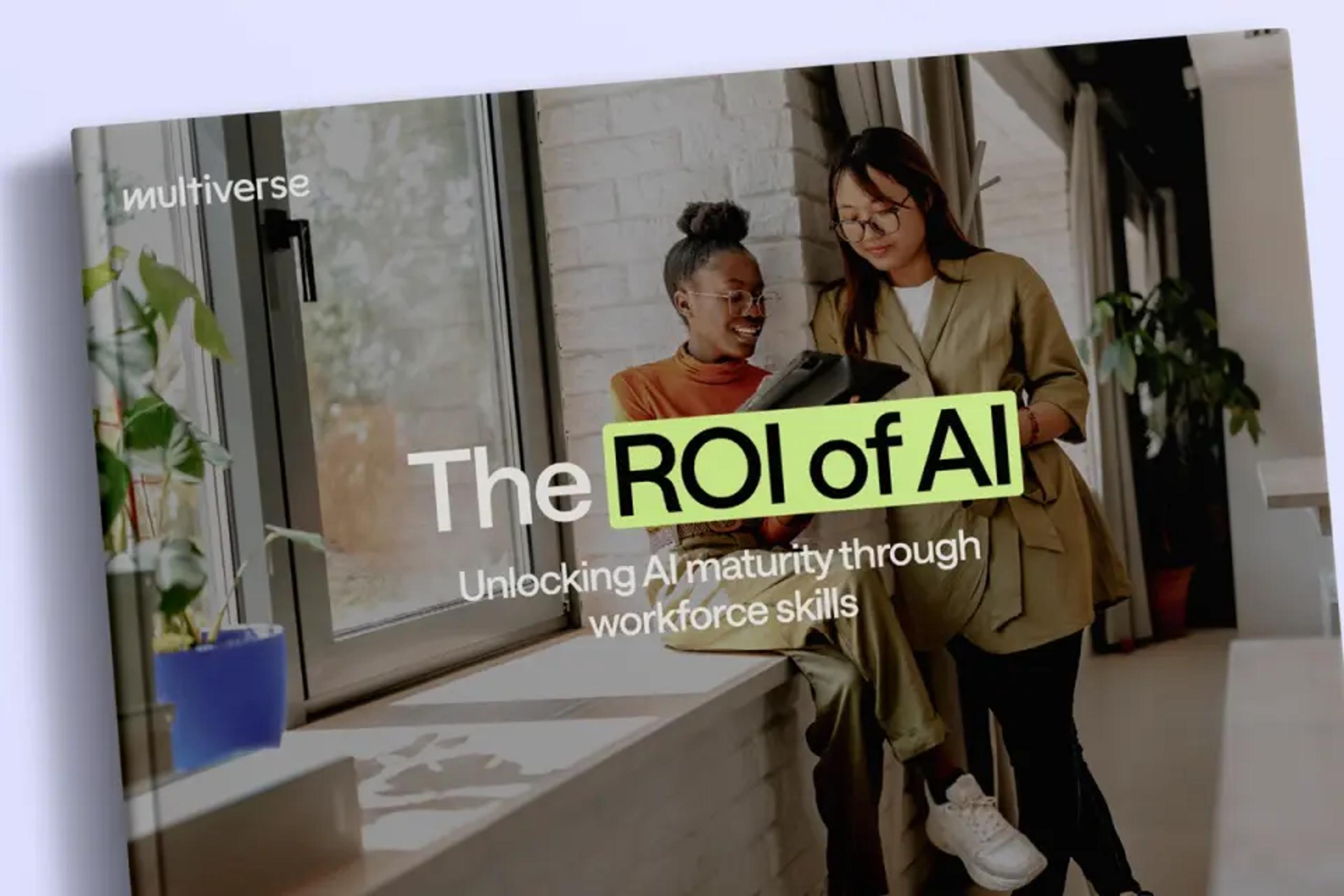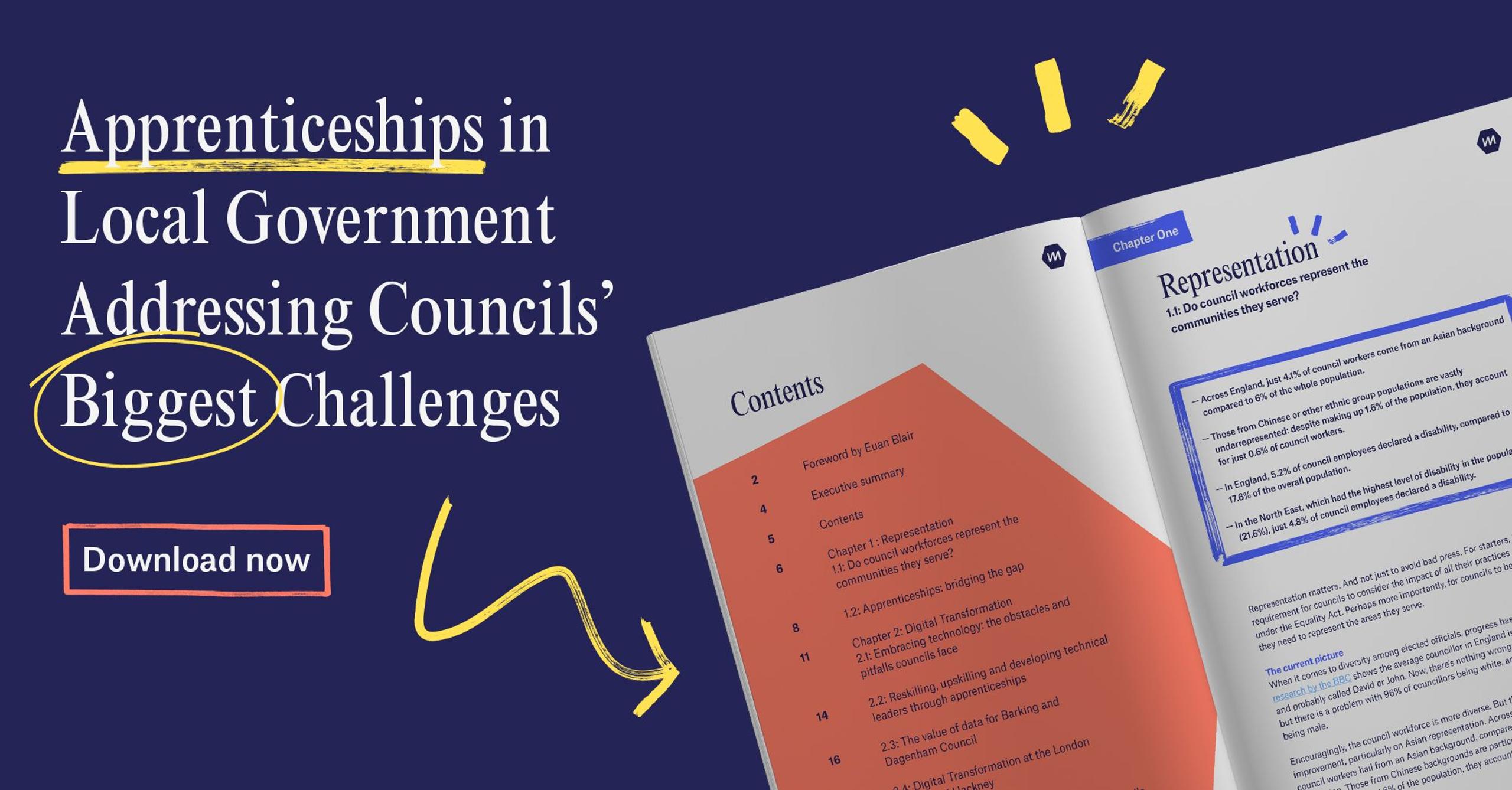Contents
Local Councils are leaders when it comes to increasing social mobility and creating opportunities for borough residents. But how can you use that drive to deliver increasingly sophisticated and ambitious projects? And how do you effectively embed diversity in your organisation?
Westminster City Council(opens new window) [WCC] has worked with Multiverse to develop a flagship scheme to maximise the benefits of apprenticeships for council employees and their residents. On August 4th, WCC’s Chief Executive Stuart Love(opens new window) was joined by representatives from 16 local councils to discuss best practices for building a pipeline of diverse talent and hiring an employee base that’s reflective of the borough representation.
Key takeaways:
- Apprentices can help achieve accurate representation of the borough’s communities
- Promoting diversity often requires having uncomfortable conversations
- Apprentices can help your managers close skills gaps
- Internal stakeholders need to be excited about apprenticeships to succeed
- It is crucial to plan for both hiring and upskilling with the levy
- The way apprentices are viewed in organisations needs to change
- Managers need coaching to effectively support entry-level talent
Read on to find out key challenges and solutions to trailblazing high-quality apprenticeships at local councils, and what you can start doing today to boost your apprenticeships.
#1
The Rooney Rule - Promoting accurate representation of borough’s communities
Diversity is at the heart of everything that WCC does, says Stuart Love. Working in partnership with Multiverse, the council has overperformed on their apprentices target, and achieved a cohort that successfully represents Westminster’s community in terms of gender and ethnic background.
To do that, they have built a pool of young talent through Multiverse's outreach events in hard-to-reach communities, whilst ensuring the high quality of candidates through our rigorous application process. You can find out more about what we do in terms of outreach and social mobility here.
Inspired by the Rooney Rule - an EFL policy that requires clubs to interview at least one BAME candidate for a managerial vacancy - the council has also encouraged employees to self-nominate to diversify the pool of applicants for the leadership and management skills programme they’ve established in partnership with Multiverse.
#2
Leader of change - Being prepared to have uncomfortable conversations
When trying to drive change in organisations that are as complex and by the nature of their size and responsibility can be bureaucratic as local authorities, you need to be prepared to take a stand. That requires having difficult conversations that can make many people uncomfortable.
But as a leader of positive change, you need to model behaviours signaling that diversity and social mobility is something that is personally hugely important to you. The change in your organisation won’t happen overnight, but exhibiting this behaviour consistently starting today can help you see tangible results in the future.
#3
‘A window to innovation’ - Closing skills gaps with apprenticeships
The shift to remote working means that it is now critical for councils to have people with relevant skills to help them progress their career and access employment opportunities of the future. But managers whose hiring budgets have been decreased during the pandemic often don’t realise that apprentices can be a solution to their problems such as lacking certain technical skills on the team.
The new ways of thinking can be the difference between succeeding or failing at digital transformation, and managers that have brought apprentices into their teams recognise that they are often the driving force behind helping their organisation tackle digital challenges. Stuart Love has named WCC’s apprentices their “window to innovation”.
#4
A win-win for everyone - getting internal stakeholders excited about apprentices
When it comes to hiring and developing entry-level talent, line managers are the key stakeholders that you need to bring on board. It’s worth keeping in mind that their personal opinion about apprenticeships could have been formed by common misconceptions or previous experiences with low-quality apprenticeship provision. That’s why at Multiverse we help organisations shift their line managers’ mindset by talking them through these misconceptions and elements of the apprenticeship process they need to be prepared to navigate.
All internal stakeholders need to understand that the entry-level apprentices coming through a careful selection process are promising and highly motivated people that can help teams solve their challenges by closing skills gaps, whilst providing a far more diverse borough-representation. It’s a win-win for everyone.
#5
Pathways to success - having a bigger conversation about changing the workforce planning
Hiring high-quality diverse young talent can make a huge positive difference on improving diversity and social mobility, and closing skills gaps in your organisation. But failing to provide upskilling opportunities to your staff can create tension in teams joined by apprentices.
The Apprenticeship Levy creates great opportunities to get people to a higher level of expertise and leadership. So before apprentices join the workforce, consider having a conversation with line managers to lay out a plan for how you’re going to use the Levy to upskill existing employees, bring in diverse young talent, and build a root for progression for them as well.
#6
Equality of talent - Ensuring apprentices are viewed like any other young talent
The participants at the roundtable recognised that their entry-level apprentices tend to be more ambitious, proactive and hungrier for knowledge than university graduates. But despite this, the perception across the wider organisation is often not in the favour of apprentices.
To change this biased mindset, Westminster City Council now ensures that apprentices are always treated the same as other young talent in the organisation by guaranteeing them a placement at the end of the programme, introducing their managers and executives to apprentices and sharing with them their apprentices’ success stories to raise awareness in all council’s departments.
#7
Lifelong legacy - Coaching managers to enable them to effectively support apprentices
It is important to recognise that for young people early in their careers starting a job remotely can be a huge challenge. That especially concerns young people who are most vulnerable, have limited support networks and living conditions that don’t provide a professional working space. The different experiences of a virtual workplace can force them to heavily rely on their manager’s support. That’s why you need to provide your managers with training and knowledge about how to manage this talent in the current environment.
At Multiverse, we ensure that disadvantaged candidates can get more from the programme than what they would get from a typical job. They’ll have coaches and mentors to support them throughout the entire process, as well as a on- and offline community of peers going through a similar process.
The benefits of our community stretch far beyond the duration of Multiverse programmes: once apprentices graduate, we keep them engaged and motivated, and encourage them to progress in their lives and careers.
3 things you can start doing today as a leader or HR professional to boost apprenticeships at your local council:
- Promote social mobility and give better access to young people facing more obstacles to great careers by running outreach events in your hard-to-reach communities
- Provide equal access to upskilling opportunities without lowering the bar by encouraging people to self-nominate and ensuring that your shortlist are always diverse
- Achieve your target of 2.3% of your staff headcount as new apprentice starts without compromising the quality of apprentices by partnering up with an apprenticeship provider that can help you grow your talent pool and identify the best people with a rigorous application process





